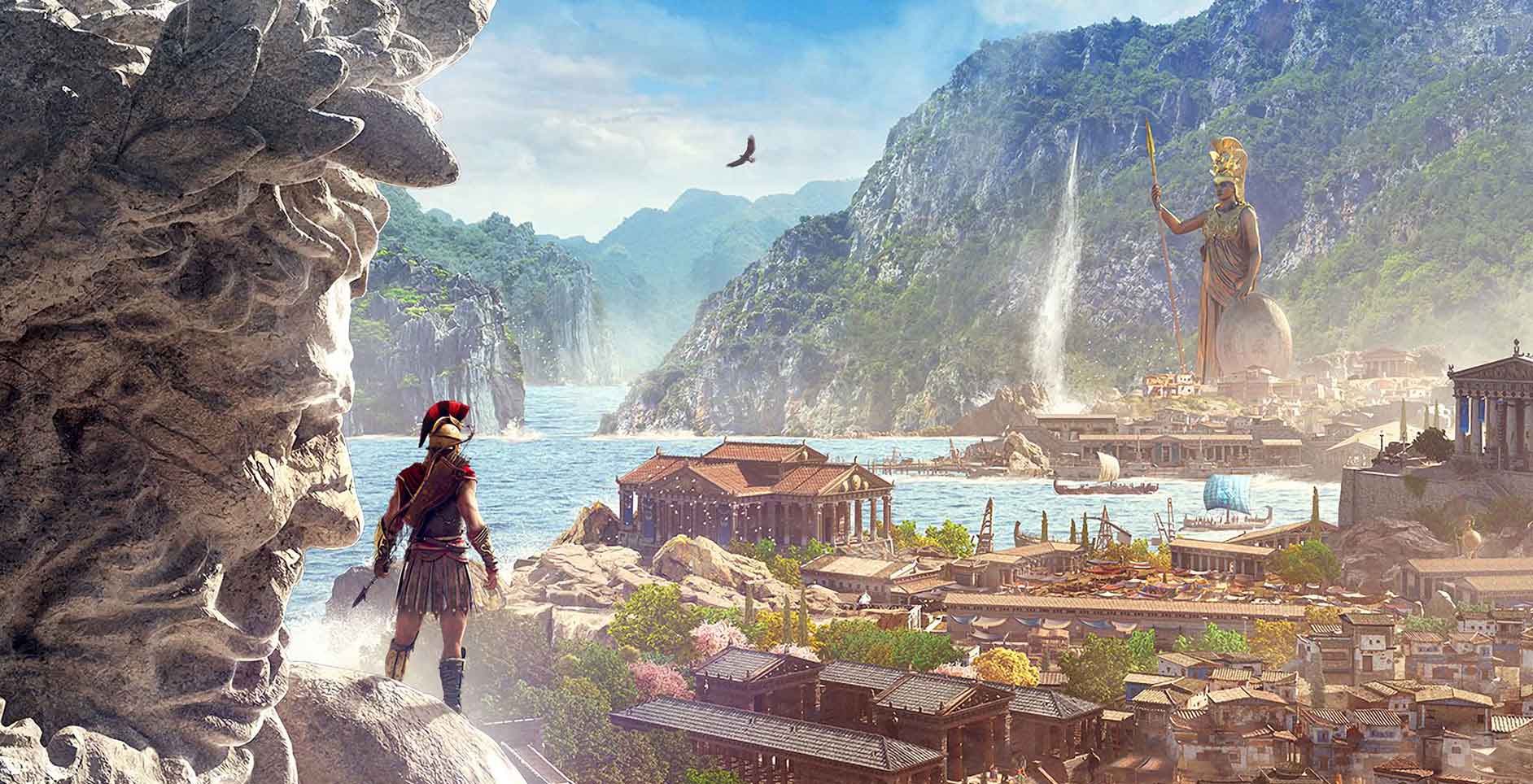Press Start may receive a commission when you buy from links on our site at no extra cost to you.
Assassin’s Creed Origins was a huge triumph for Ubisoft. After releasing a game once a year (sometimes three, even) for seven years, the Assassin’s Creed brand was suffering. Origins was a breath of fresh air in pretty much every aspect, and I was content with where the franchise was. With Odyssey releasing only a year later, I was worried. Worried that Ubisoft may not have realised that taking a break was what made Origins so great. Thankfully, despite coming so soon after Origins, Odyssey is an improvement on Origins in practically every way.
Perhaps the biggest improvement with Odyssey is the way the story is presented and just how compelling it is. The crux of your experience will be spent with either Alexios or Kassandra, who must travel throughout the Greek islands to reunite their family following a tragic event in the past that tore them apart. Throughout your journey you’ll meet with many famous figures throughout Greece’s storied past such as Socrates, Hippocrates and Perikles who adds an extra layer of political intrigue and drama to the story. For potentially the first time in the franchise since Assassin’s Creed II and Brotherhood, Odyssey has a story that grabbed me from beginning to end. Plenty of twists permeate the narrative to keep you guessing from beginning to end, but multiple story arcs that all interact with one another helps to keep the story compelling. It’d be downright criminal to ruin them or explain them in detail – but you can expect additional plotlines that deal with sinister and manipulative cults, the continuance of Layla Hassan’s story from Origins and of course further exploration of the first civilizations role in all of this.
For potentially the first time in the franchise since Assassin’s Creed II and Brotherhood, Odyssey has a story that grabbed me from beginning to end. Plenty of twists permeate the narrative to keep you guessing from beginning to end, but multiple story arcs that all interact with one another helps to keep the story compelling. It’d be downright criminal to ruin them or explain them in detail – but you can expect additional plotlines that deal with sinister and manipulative cults, the continuance of Layla Hassan’s story from Origins and of course further exploration of the first civilizations role in all of this.
Ubisoft have stayed rather mum on the story of Odyssey, and with good reason. Filled with so many genuine surprises and story threads, Assassin’s Creed Odyssey is the first time in a long time that the games actually feel like they’re working towards something again. In terms of raw gameplay, the experience remains largely the same from Origins, carrying over the major improvements to the formula whilst still managing to improve on them ever so slightly. The combat remains as involving as ever, with enemies no longer waiting politely to take turns at attacking you – they will gang up on you and you will die quickly, making stealth just as viable an approach if you’re not the best at active combat.
In terms of raw gameplay, the experience remains largely the same from Origins, carrying over the major improvements to the formula whilst still managing to improve on them ever so slightly. The combat remains as involving as ever, with enemies no longer waiting politely to take turns at attacking you – they will gang up on you and you will die quickly, making stealth just as viable an approach if you’re not the best at active combat.
The first most noticeable change in Odyssey is the way it streamlines your equipment and abilities in a much simpler way than Origins did. As an example, bows have been reworked so that each bow can do anything if you’ve got the right abilities unlocked – no more Hunter, Predator and Light distinctions. Similarly, every type of weapon you can wield now has a unique “overkill” move that deals damage and has specific applications in battle, encouraging you to mix up your weapon choices throughout your mercenary’s journey.

Assassin’s Creed tends to become too easy as you unlock more and more abilities, but cleverly tying these abilities to your adrenaline meter (which increases with each standard stealth kill or subsequent hits in battle) means that you can’t just use and abuse your favourite abilities anymore. In Origins, I could stand back and take out an entire camp with the same bow and arrow for hours of my adventure or abuse smoke bombs to escape an encounter. In Odyssey, I constantly found myself changing up my approach, relying on and trying different abilities, which gives a greater sense of dynamicity to the moment-to-moment gameplay. In short, Odyssey never gets boring and remains challenging from beginning to end.
Obviously changing most equipment into abilities with cool-downs and finite uses gears Odyssey towards being more of a full-blown RPG than any of the previous Assassin’s Creed games. This design philosophy continues with the way quests are designed and the new dialogue system. Taking a page out of The Witcher’s playbook, Odyssey ensures that every quest feels important and helps to develop the story of the world, your character or both. Barring some of the daily challenges (which seem to be procedurally generated) every side quest has a compelling little story to go with it that I found myself caring about. This is best demonstrated when the game throws over the major choices to you, which is where Odyssey plays its other major strength. Every interaction you have in Odyssey with other characters has a conversation system akin to games like The Witcher and Mass Effect. Fashioned more so like the former than the latter, the choices you make can also open other quests or make them play out differently too. There’re also no arbitrary “good” and “bad” responses so you can play Alexios or Kassandra however you want to without fear of penalty. I never thought I’d say this in my time of playing games, but with Odyssey Ubisoft have crafted a better a better BioWare game than BioWare has in recent years.
This is best demonstrated when the game throws over the major choices to you, which is where Odyssey plays its other major strength. Every interaction you have in Odyssey with other characters has a conversation system akin to games like The Witcher and Mass Effect. Fashioned more so like the former than the latter, the choices you make can also open other quests or make them play out differently too. There’re also no arbitrary “good” and “bad” responses so you can play Alexios or Kassandra however you want to without fear of penalty. I never thought I’d say this in my time of playing games, but with Odyssey Ubisoft have crafted a better a better BioWare game than BioWare has in recent years.
The other major inclusion is the return of naval combat, which is more akin to Black Flag and Rogue than the very brief sequences we saw in Origins. Thankfully, these moments play a lot more fluidly than they ever did in previous games; there’s no awkward load times splitting up on-foot moments, naval combat and boarding of the ship. Everything feels incredibly seamless which does wonders for ensuring that even if you don’t like naval combat, it’s much less of a jarring nuisance than in previous games. There are other systems in place that make the world of Greece feel alive. You can recruit and assign most of your enemies to your ship to buff certain aspects of it, making your crew feel like they’re around even when you’re not on the ship – you’ll even be able to summon them to help you out ala Brotherhood. You’ll also track down members of the Cult of Kosmos, where killing a member yields clues about the others in a complex web-like interface that slowly reveals itself the more you investigate.
There are other systems in place that make the world of Greece feel alive. You can recruit and assign most of your enemies to your ship to buff certain aspects of it, making your crew feel like they’re around even when you’re not on the ship – you’ll even be able to summon them to help you out ala Brotherhood. You’ll also track down members of the Cult of Kosmos, where killing a member yields clues about the others in a complex web-like interface that slowly reveals itself the more you investigate.
A little more intriguingly, a new wanted style system where any actions like murder, theft or general disruption accrues a bounty which can be paid off or hunted by tiers of other mercenaries in the world. These mercenaries are a mix of purposefully designed and randomly generated warriors who roam the world like Phylakes from Origins. Some of them are standard warriors, others travel with tamed animals like bears and lions. Their mere presence in the game shakes things up, because you’ll never know when you’ll run into one given that they all roam the islands and especially hunt you as your wanted level / bounty increases, but it also lends credibility to how alive the world feels. There is another major system in place that’s new for Odyssey but feels like a mish-mash of ideas from Brotherhood and Revelations, and that’s the Conquest Battles. Designed to play off the idea of the Peloponnesian War – you’ll have to reduce a regions resources, kill their leader and then select to fight for the Athenians or the Spartans in a complex large-scale battle on-foot or at sea. These were the only element of the game that felt firmly stuck in the old style of Assassin’s Creed games, reducing arbitrary meters on screen before fighting in an arbitrary battle. They’re not completely compulsory, which is nice, but they’re easily the most pointless new addition in Odyssey.
There is another major system in place that’s new for Odyssey but feels like a mish-mash of ideas from Brotherhood and Revelations, and that’s the Conquest Battles. Designed to play off the idea of the Peloponnesian War – you’ll have to reduce a regions resources, kill their leader and then select to fight for the Athenians or the Spartans in a complex large-scale battle on-foot or at sea. These were the only element of the game that felt firmly stuck in the old style of Assassin’s Creed games, reducing arbitrary meters on screen before fighting in an arbitrary battle. They’re not completely compulsory, which is nice, but they’re easily the most pointless new addition in Odyssey.
In terms of presentation, Odyssey goes above and beyond to try and eclipse the more exotic locations of Egypt that features in Origins. The world of Greece has been beautifully realised here, and it’s astounding to see how much variety Ubisoft has packed not only between the islands but on the islands themselves too. At first I was a little underwhelmed with Greece when compared with Egypt’s sprawling deserts, but as I discovered more and more of the massive map it was hard to compare. Ubisoft’s Greece is absolutely stunning.




